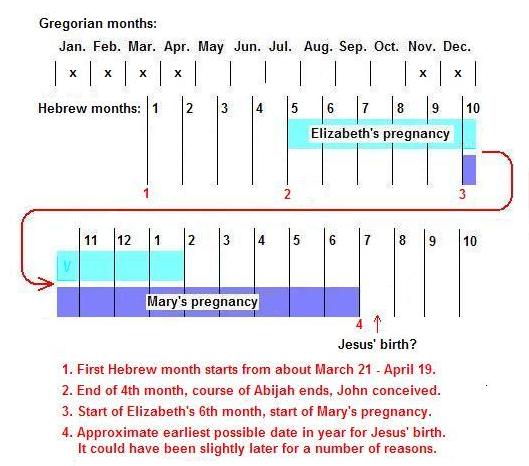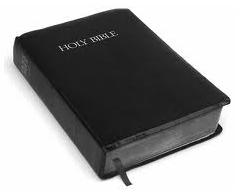|
The Date of Jesus' Birth
According to the Bible
Was the date of Jesus' birth really December 25 or was it at another time of year? What does the Bible say? Shouldn't it be consulted on such a question? Most people are happy to celebrate Christmas on December 25 and really don't care if that was the correct date or not. But think of it: would you, for instance, go to your spouse and say "happy anniversary" months from your true anniversary date? Doesn't it make sense to observe an anniversary on the anniversary? So when was Jesus born? Let's take a look in the Word for answers.
Please note that this study is also available as a downloadable ebook The Date of Jesus' Birth (PDF-format, 951 kb). Feel free to download it and share it with others.
The Date of Jesus' Birth According to the Word of God
The Bible actually does not give the date as directly as we might like. However, by piecing together a number of clues we can come close to establishing the correct date of Jesus' birth.
The Date of Jesus' Birth and the Shepherds
The first clue concerns the reference to the shepherds to whom the birth was announced:
"And there were in the same country shepherds abiding in the field, keeping watch over their flock by night." (Luke 2:8)
The word "abiding" (the NKJV has "living") indicates that they were staying out with their flocks day and night which they did in that area when the weather was suitable. However, in winter, it is cold there and they can get heavy rains and even snow in the hills around Bethlehem. This just tells us that it was likely not in the winter months or before the rains of April were done. So, from our first clue, it would be reasonable to say it was sometime from May through October and some months can be eliminated:
Let's see if we can get closer. To do that, we will have to look at the Hebrew calendar in relation to scripture and then relate that to our calendar.
The Date of Jesus' Birth Relative to John the Baptist's Birth
Jesus was born several months after John the Baptist to whom he was related and there are some Biblical clues related to John's birth that can help us sort out the timing.
"There was in the days of Herod, the king of Judaea, a certain priest named Zacharias, of the course of Abia: and his wife was of the daughters of Aaron, and her name was Elisabeth." (Luke 1:5)
Zacharias was a priest who became the father of John the Baptist. We are told when the various courses of the priests were assigned to serve in the temple. The various groupings (by family) of the priests were divided by lot into terms of service during the year:
"The seventh to Hakkoz, the eighth (lot) to Abijah," (1 Chron 24:10)
"These were the orderings of them in their service to come into the house of the LORD, according to their manner, under Aaron their father, as the LORD God of Israel had commanded him." (1 Chron 24:19)
Note that "Abia" and "Abijah" are just variations in spelling. Assuming approximately 2 courses per month (there were 24 in total as described in 1 Chronicles chapter 24), the eighth course would be from about the middle to the end of the fourth month. That would put his service in about July-August as the first month in the Hebrew religious calendar was (and is) Nisan about the beginning of spring. The angel told him:
"But the angel said unto him, Fear not, Zacharias: for thy prayer is heard; and thy wife Elisabeth shall bear thee a son, and thou shalt call his name John." (Luke 1:13)
You can read more details of the announcement in Luke 1. The promise was soon in process of fulfillment:
"And it came to pass, that, as soon as the days of his ministration were accomplished, he departed to his own house. And after those days his wife Elisabeth conceived, and hid herself five months, saying," (Luke 1:23-24)
It may not be so much that she was hiding all that time so that no one could see her but that she was hiding her state until she got to the point that if she told someone she was pregnant they would believe her because it was obvious. Remember the description of Zacharias and Elizabeth:
"And they had no child, because that Elisabeth was barren, and they both were now well stricken in years." (Luke 1:7)
Elizabeth wouldn't be saying the following during the time she "hid herself":
"Thus hath the Lord dealt with me (by allowing a pregnancy) in the days wherein he looked on me, to take away my reproach (being barren) among men." (Luke 1:25)
If she wanted to hide she certainly wouldn't be announcing her pregnancy - that would have brought everyone in town to see her - and probably even a reporter from the Jerusalem Post. She would say it at the point she made her condition publicly known. It is probable that, at this same point, after the five months were over, that her condition would also have been revealed to Mary ("... thy cousin Elisabeth, she hath also conceived ..." Luke 1:36).
So, after Elizabeth's fifth month was complete, another coming birth was announced:
"And in the sixth month the angel Gabriel was sent from God unto a city of Galilee, named Nazareth," (Luke 1:26)
Gabriel gave this announcement to Mary:
"And, behold, thou shalt conceive in thy womb, and bring forth a son, and shalt call his name JESUS. He shall be great, and shall be called the Son of the Highest: and the Lord God shall give unto him the throne of his father David:" (Luke 1:31-32)
Mary went to visit and her cousin Elizabeth and stayed for a time:
"And Mary arose in those days, and went into the hill country with haste, into a city of Juda; And entered into the house of Zacharias, and saluted Elisabeth. ... And Mary abode with her about three months, and returned to her own house ..." (Luke 1:39-40, 56)
From the timing we have seen so far, it is likely that Mary returned home in time for Passover in the first month in her home town. It seems that she left before Elizabeth gave birth because the next verse says:
"Now Elisabeth's full time came that she should be delivered; and she brought forth a son." (Luke 1:57)
Jesus was then born, at the earliest, at the end of the sixth month and quite likely somewhat into the seventh month which would be in the fall of the year - about our September-October. The reasoning above does not give us an exact date and there are too many unknown variables to be able to do that from just that information. For example:
- Each course of the priesthood may have been not just half a month but somewhat longer since 365 / 24 = 15.2 days. If that was the case, being of the eighth course, Zacharias' duties may have ended eight days or more into the 5th month.
- Zacharias may have taken even a few days to return home. Hebron (or one of the cities) assigned to the priests (Josh 21:9) in the hill country of Judah (Luke 1:39, Josh 21:11) is about 20 miles from and about 500 feet higher than Jerusalem and in a hilly area. Remember also, that he was an old man.
- A woman's first pregnancy often goes a little over term!
At least we have established for sure that it was in the fall of the year. So far, the timing would look approximately like this:
Approximate Time
(Hebrew months) |
Event |
| End of 4th month: |
Elizabeth conceived (then hid herself 5 months) |
| End of 9th month: |
Mary conceived (5 months after Elizabeth.)
Mary went to visit Elizabeth (for 3 months) |
| End of 12th month: |
Mary returns to her home (likely for Passover) |
| End of 1st month: |
John is born (early the next year) |
| During 7th month: |
Jesus is born |
We could diagram what we have so far like this:
Note About the Duration of Human Gestation: The gestation period - the duration of pregnancy in humans - is about 266 days (38 weeks) from the time of fertilization until birth. (In obstetrics, it is counted from the first day of the woman's last normal menstrual period prior to fertilization, or about 40 weeks.)
http://medical-dictionary.
Using the actual 266 days gestational time and the fact that Hebrew months average 29.5 days, it actually works out nicely to:
266 days / 29.5 days/Hebrew month = 9.0 Hebrew months
We are getting close - we have the date of Jesus' birth down to one Hebrew month. But there are yet more clues.
The Date of Jesus' Birth and the Feast of Tabernacles
Here is another important indication of the correct timing. The Bible says:
"And the Word was made flesh, and dwelt among us, (and we beheld his glory, the glory as of the only begotten of the Father,) full of grace and truth." (John 1:14)
The word "dwelt" is from the Greek word "skenoo" (Strong's H4637) and is defined as:
1) to fix one's tabernacle, have one's tabernacle, abide (or live) in a tabernacle (or tent), tabernacle
2) to dwell
It comes from another Greek word "skenos" (Strong's H4636) which is defined as:
1) a tabernacle, a tent
2) metaph. of the human body, in which the soul dwells as in a tent, and which is taken down at death
John uses the same word in the book of Revelation to describe God being with us for eternity:
"Therefore are they before the throne of God, and serve him day and night in his temple: and he that sitteth on the throne shall dwell among them." (Rev 7:15)
"And I heard a great voice out of heaven saying, Behold, the tabernacle of God is with men, and he will dwell with them, and they shall be his people, and God himself shall be with them, and be their God." (Rev 21:3)
So it can be understood as Him "dwelling" or "tabernacling" with us. An Old Testament prophecy spoke of this:
"Therefore the Lord himself shall give you a sign; Behold, a virgin shall conceive, and bear a son, and shall call his name Immanuel." (Isa 7:14)
Then, in the New Testament, we are given the meaning of this word:
"Behold, a virgin shall be with child, and shall bring forth a son, and they shall call his name Emmanuel, which being interpreted is, God with us. (Matt 1:23)
As far back as the Exodus, God spoke of His wanting to dwell with His people:
"And let them make me a sanctuary; that I may dwell among them." (Exo 25:8)
God wants to tabernacle with us and this is pointed forward to by the feast of Tabernacles which occurs each year in the fall.
Considering that the first verse we looked at in this section said that "the Word was made flesh, and dwelt among us" it is not too much of a stretch to say that, logically, He would have come to dwell or tabernacle with His people at the feast of Tabernacles, during the seventh Hebrew month. The evidence of this study points to Tishri 15 on the Hebrew calendar as the date of Jesus' birth.
|
Prophecy Newsletter
Receive
free newsletters
reporting and analysing world events related to prophecy.
The Greek has multiple words for forgiveness? God forgives ( charizomai) whether we ask or not. Receiving forgiveness ( apheimi) is by our choice. God always forgives!
|








New! Comments
Have your say about what you just read! Please leave a comment below.